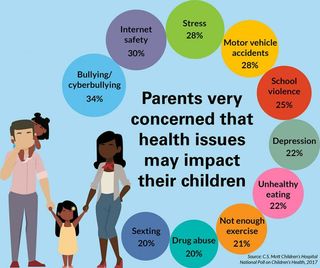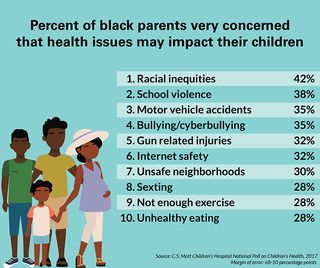Health
Top 10 Concerns Parents Have for Their Own Kids (and Others)
Bullying/cyberbullying and racial inequity are top concerns for U.S. children.
Posted August 21, 2017 Reviewed by Jessica Schrader

Once a year, the University of Michigan publishes the results of the C.S. Mott Children's Hospital "National Poll on Children's Health" (NPCH) based on adult perceptions regarding various health issues facing U.S. children and teens. For this year's report, the "Mott Poll" surveyed a diverse national sample of childless adults and parents to identify which health issues were most commonly rated as a "big problem." The 2017 results of the NPCH Mott Poll were published on August 21.
The majority of adults and parents across the country ranked bullying/cyberbullying as their biggest concern for children in the United States. The 2017 report is based on a nationally representative household survey of 2,051 adults, which included 1,505 parents of children ages 0-18.
The first portion of the survey asked adults age 18 and older to “Think about children and teens in the US.” Then, the survey asked participants “How big of a problem do you feel the following health issues are for children and teens across the United States?” (1) Big Problem, (2) Somewhat of a Problem, (3) No Problem. There were 24 issues listed in the survey. For the first time, a second portion of this year’s survey asked parents how these same issues might impact their own children.
Top 10 Health Concerns for Children in 2017 (Mott Poll Report)
- Bullying/cyberbullying (61%)
- Not enough exercise (60%)
- Unhealthy eating (57%)
- Drug abuse (56%)
- Internet safety (55%)
- Child abuse and neglect (53%)
- Suicide (45%)
- Depression (44%)
- Teen pregnancy (43%)
- Stress (43%)
As the father of a 9-year-old and a public health advocate, I find these top 10 lists of common concerns various parents have for their own children—as well as other kids across the country—makes it easier to target a specific concern and come up with a strategy to address each issue moving forward.

Notably, the 2017 Mott Poll Report states: "Results also showed patterns by the racial/ethnic groups of parents. Black parents differed from Hispanic and white parents in the level of concern expressed regarding both racial inequities in health and in school violence. This finding likely reflects the impact of contemporary social issues on health priorities and highlights that both experiences and perceptions can differ significantly among different groups of parents. Recent national and local efforts to identify and address racial disparities in health are beginning to focus on these concerns."
Although many of these health issues may not be directly in the locus of our control as parents or citizens, having this nationwide data can serve as a platform to start a dialogue with our children and others. Ranking the prevalence of specific health concerns is also a first step towards coming up with a multipronged approach to address each concern.
In terms of 'controlling your controllables' as a parent, the authors of the Mott Report offer some tangible advice on a variety of things parents can do to prevent common illnesses and to keep their children as safe as possible. These include making sure children stay up to date on their immunizations, facilitating regular physical activity, healthier eating, teaching online safety skills, using car seats/boosters/seatbelts, and wearing a helmet whenever riding a bicycle.
Clearly, just about everybody is concerned about internet safety and cybersecurity. Along with issues of cyberbullying and online predators, excessive social media usage has been linked to an increased risk of perceived social isolation and loneliness for people of all ages.
I know from personal experience that monitoring my daughter's online activity is a tricky business. (She's more tech-savvy than I am and can be very sneaky.) That said, this report has inspired me to up my game and make sure that I do everything in my power to keep my daughter psychologically and physically safe in the Wild West of cyberspace.
In a statement, Gary Freed, professor at the Children Health Evaluation and Research Center (CHEAR) and co-director of the Mott Poll advised: "Adults across the country recognized bullying, including cyberbullying, as the leading health problem for U.S. children. Parents should regularly discuss internet safety with their children and teens and ways to prevent problems. Simple effective strategies may include not providing personal identifying information on social media, chat platforms, or in shared gaming environments."


